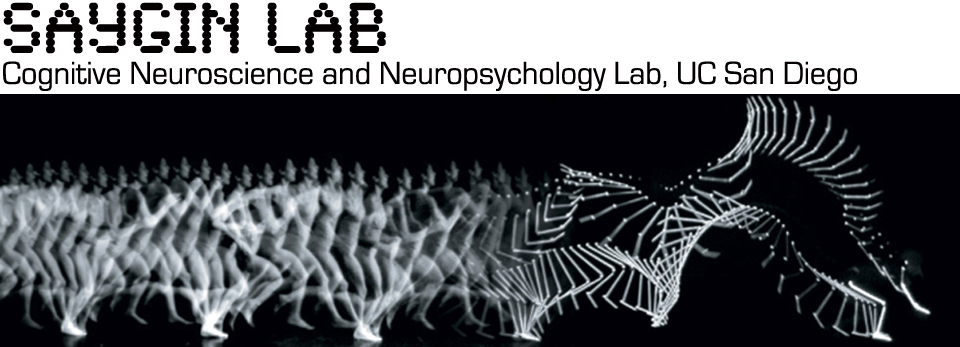Prospective PhD students: We currently have openings for new graduate students interested in joining our group. Successful applicants must have a strong academic record and have a strong interest in our research program, which includes work in the fields of cognitive neuroscience, perception, social neuroscience, computational neuroscience, human-robot interaction, artificial intelligence, social robotics, consciousness, multisensory integration, attention and awareness.
Graduate students are not admitted directly to the lab but need to apply to a graduate program we are affiliated with (see links to the Cognitive Science and Neurosciences programs below). Prospective applicants should familiarise themselves with our published work (see Publications and Projects), and are encouraged to contact Prof. Saygin (email ucsd dot cogneurolab at gmail dot com) to express interest in joining the lab. Please include a CV and describe your research interests and career goals. In particular, please explain why you are interested in our lab and our research program. Mention in your CV and/or your email any research experience, programming or other technical and analytical skills, publications/presentaitons, and whether you already have secured any funding for graduate school.
—
We take career development for graduate students seriously. This site contains some links to resources that can be useful in navigating graduate school and preparing yourself for different career paths post PhD.
Inquiries from students who would like to apply for lab rotations are also welcome. Our lab rotations tend to be hands on and geared towards acquiring skills applicable to cognitive neuroscience research. Students typically have individual or group projects that involve collection or analysis of data. Students can also get training in computer programming for experiment design and analysis. All rotation students are expected to keep lab notebooks, and to prepare written reports on the project at least quarterly. Rotation students are encouraged to take on meaningful research projects that can lead to publications. For this reason, we usually prefer rotations that are 2 quarters or longer. This does not mean you have to receive lab rotation credits; students may continue projects they start as part of a lab rotation either informally, or by adding “laboratory research” credits. Rotation students are full members of the lab as long as they’re working in the lab. This means they can expect to receive training and mentoring from the PI and peers, and they’re expected to follow all lab policies and participate in lab activities. Lab Meetings include both “journal club” style discussions of important papers in cognitive neuroscience, and project and data presentations and regular sessions on career development. If you are a graduate student interested in doing a lab rotation, you should contact Professor Saygin.
Local Info:
UCSD Neurosciences Graduate Program
Office of Graduate Studies
UCSD Grad Funding Blog
New Grad Student FAQLinks, Articles, Resources:
Illustrated guide to the PhD: If this depresses you, don’t even start!
Naturally Obsessed: The Making of a Scientist (Movie)
How to Write a Dissertation
Dear Former Graduate Student (Massimo Boninsegni) (A must-read for postdocs and graduate students)
Some Modest Advice for Graduate Students
A Less Cynical Reply to the Above
On Confidence
Some Frank Advice for Graduate School
Staying Healthy, and Even Happy, in Graduate School
International Student?
Choosing a Thesis Lab after Rotations
Changing Advisors
Planet of the Professors
On Responsibilities of Grant-Funded Students
The PhD Experience (Mihir Bellare, UCSD CSE)
More on Grant-Funded Students
3 Qualities for Success in Grad School (and beyond)
Graduate School Soul Searching
Project Runway and Graduate School
